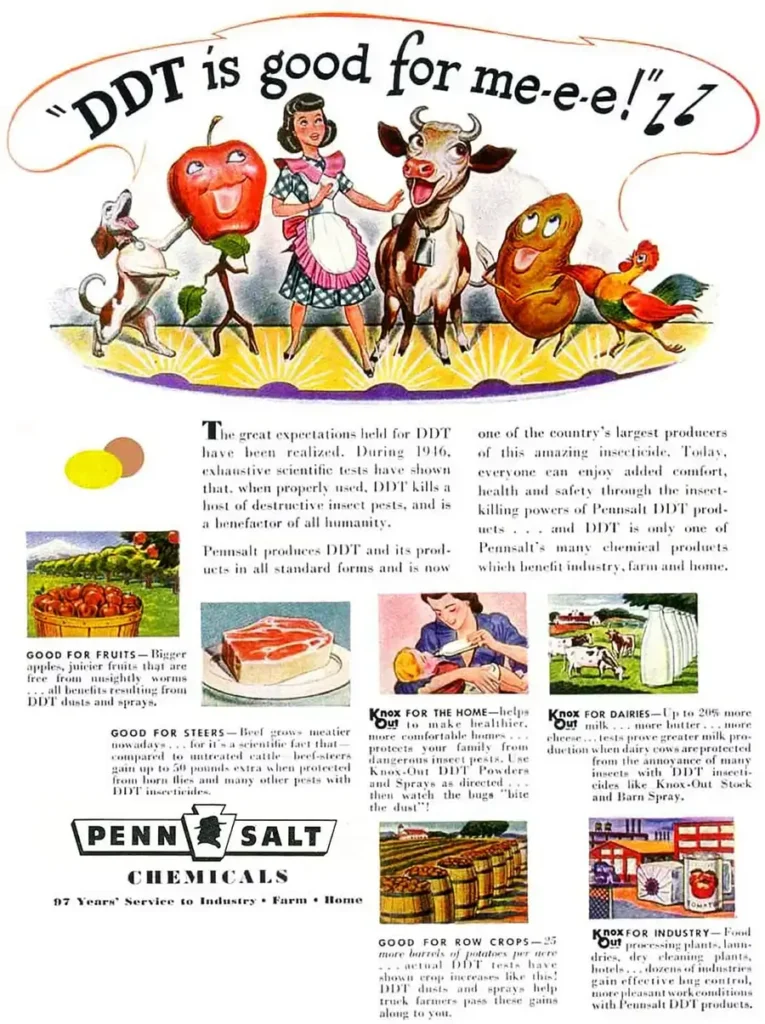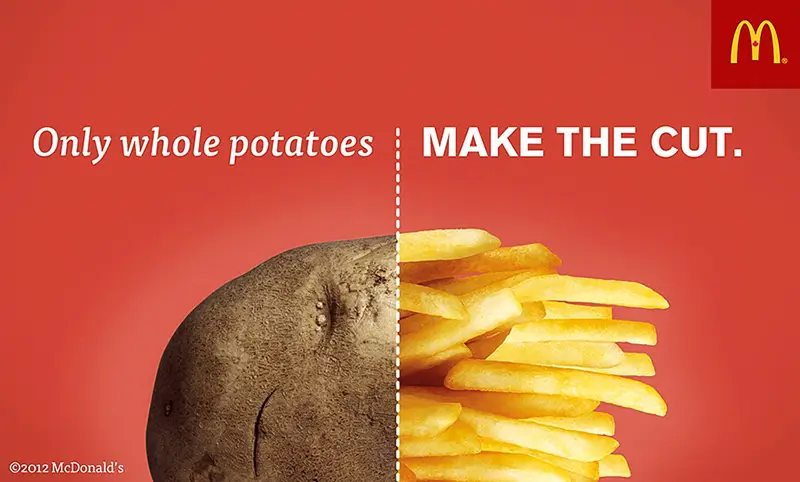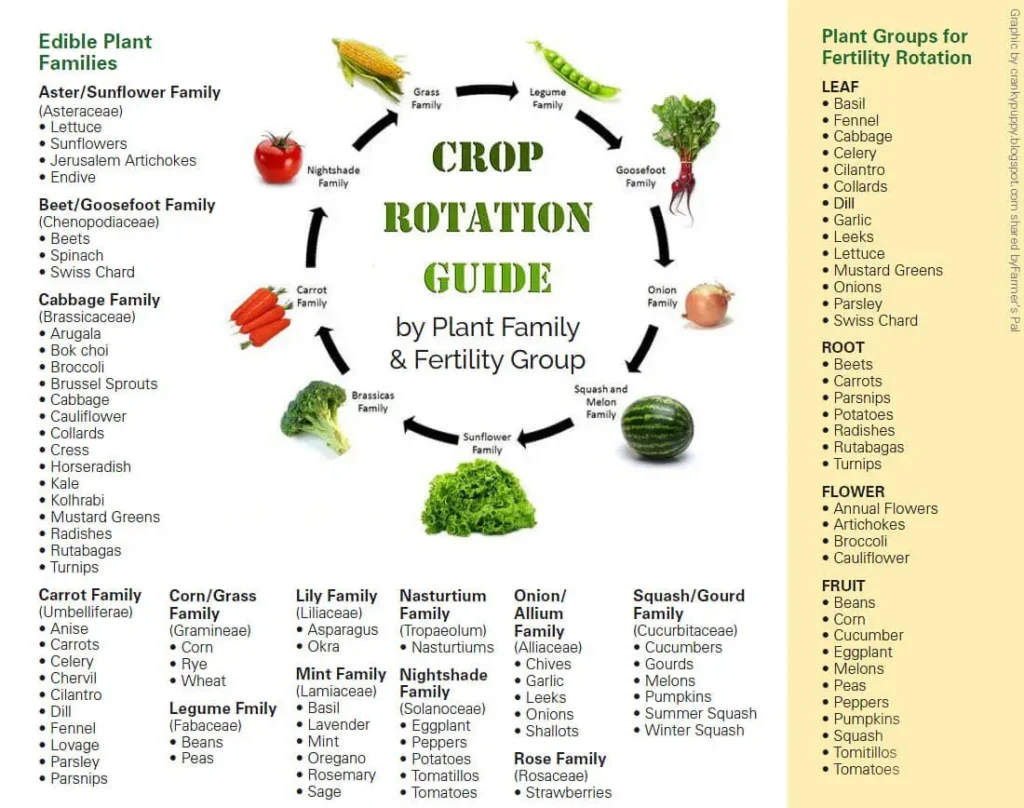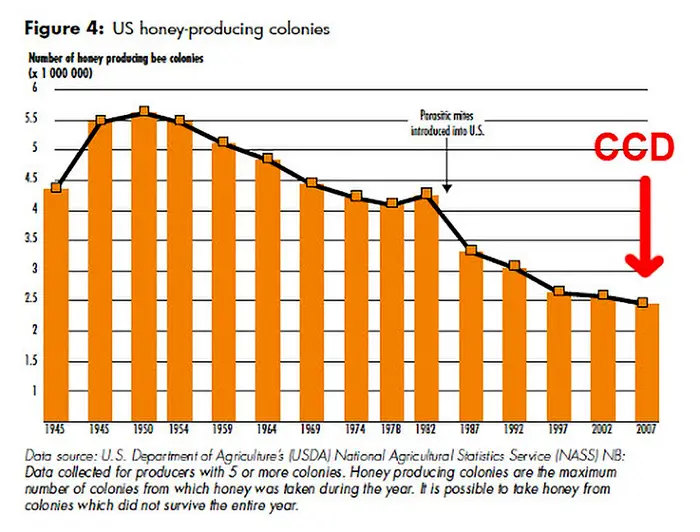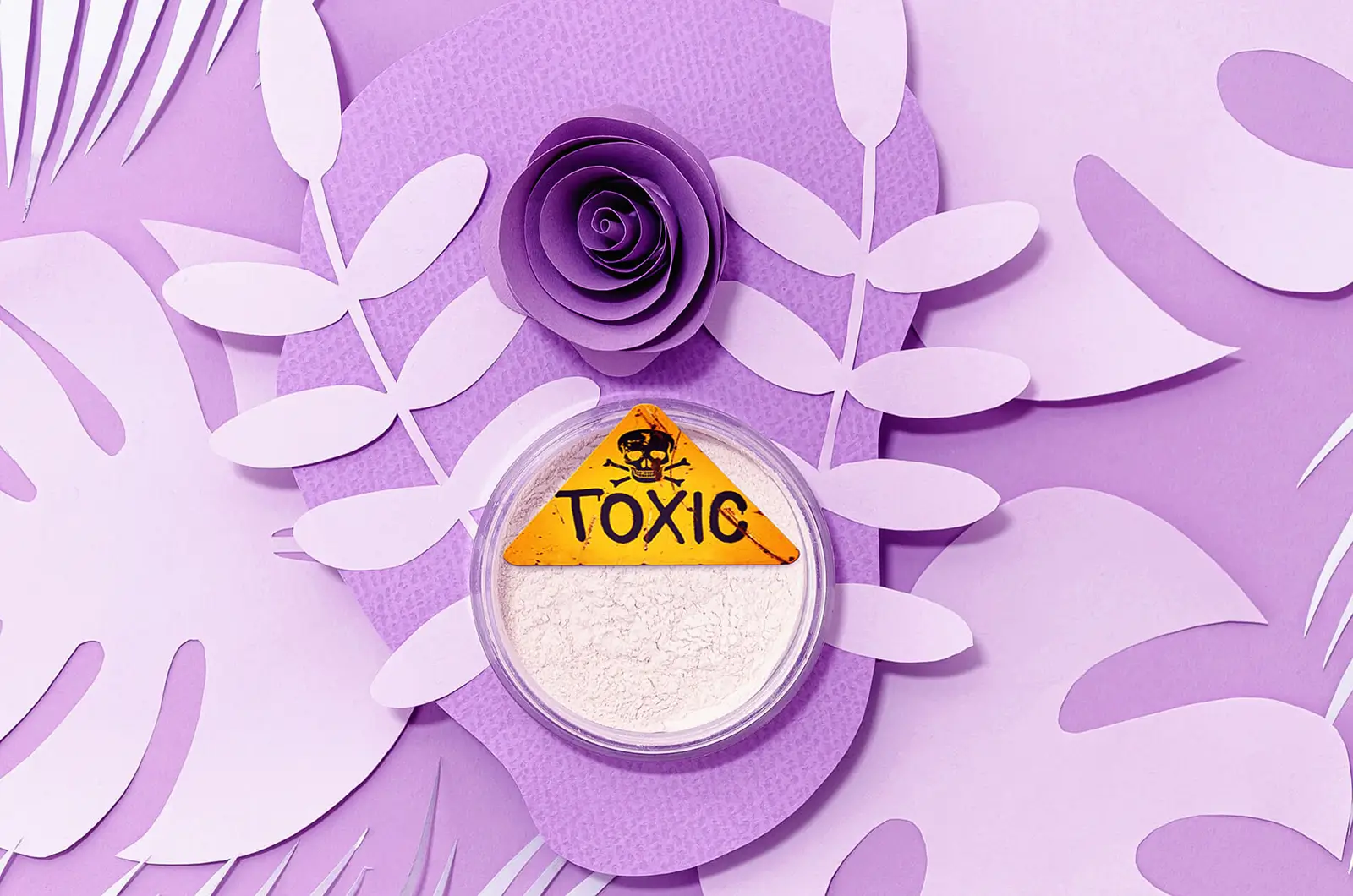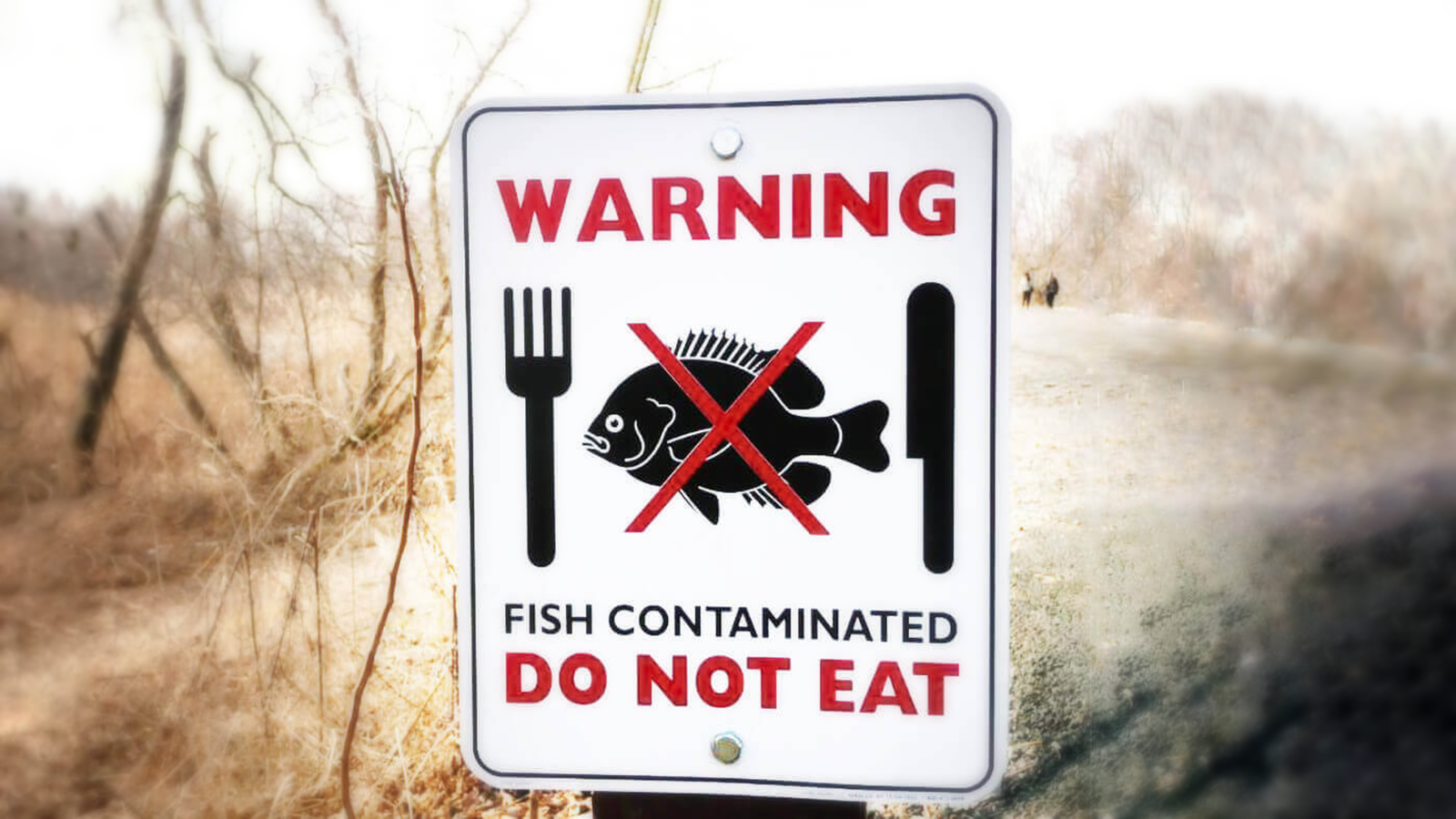Pesticidas, OGM e Sobrecarga Tóxica.
A exposição a pesticidas causa directamente cancro, defeitos de nascença, esterilidade e infertilidade, danos no cérebro e sistema nervoso, fígado, rins, e outros órgãos.
Milos Pokimica
Escrito por: Milos Pokimica
Revisto Clinicamente Por: Dr. Xiùying Wáng, M.D.
Actualizado em 9 de Junho de 2023Todos os pesticidas são semelhantes. Alguns são mais tóxicos, outros menos, mas todos são tóxicos. Não existe hoje um único pesticida que seja promotor de saúde. O DDT, por exemplo, é agora uma substância proibida em muitas partes do mundo, mas já não o era em tempos. O governo aprovava o produto, e a indústria química empurrava-o agressivamente. Permaneceu maciçamente apoiado durante um período prolongado pelo governo e pela indústria. Um tipo de substância milagrosa. A arma diabólica da ciência moderna mata milhares de milhões de insectos e salva milhões de seres humanos. A solução final para o paludismo e outras doenças que transportam insectos.
Os pesticidas são neurotoxinas para os insectos mas não para os humanos. O DDT nos insectos abre canais de iões de sódio nos neurónios, fazendo com que disparem espontaneamente, o que leva a espasmos e eventual morte. Tudo o que o insecto precisa de fazer é caminhar sobre a superfície tratada. Na mente do cientista, tratava-se apenas de uma neurotoxina para insectos. Eles não podiam considerar a probabilidade de que pudesse fazer outras coisas a longo prazo. Um grande pedaço de pesticidas utilizados hoje em dia é muito pior do que o DDT.
Uma outra razão pela qual o DDT foi proibido é que durante 30 anos foi utilizado em excesso e os insectos tornaram-se resistentes a ele. Acontece num ambiente quando é introduzido um veneno.
Alguns insectos sobrevivem e multiplicam-se. As características genéticas dos sobreviventes serão mais adaptadas contra o mesmo tipo de pesticidas. O pesticida utilizado pela primeira vez terá o impacto mais significativo e causará mais danos. No entanto, alguns insectos que sobrevivem irão transportar os seus genes para a frente. Com o tempo, as gerações vindouras serão capazes de resistir mais aos seus efeitos e, eventualmente, de se tornarem tolerantes. Como os mosquitos na África do Sul. Quanto mais tempo um produto químico for utilizado, mais resistentes os insectos se tornarão. É a mesma história que as estirpes de bactérias resistentes a antibióticos. Quando isto acontece, os venenos mais eficazes e mais potentes, e tóxicos, têm de ser utilizados pelos agricultores. Isso irá repetir o ciclo. Novos compostos são normalmente mais caros, pelo que o custo económico se tornará mais elevado e são também cada vez mais tóxicos. Isso gera um nível de poluição mais elevado e, portanto, deteriora ainda mais o equilíbrio global do ecossistema.. A elevada taxa de reprodução dos insectos significa que dentro de algumas décadas eles podem tornar-se tolerantes, mas e você?
Os pesticidas escorrerão para águas subterrâneas e ribeiros e rios. Isso irá afectar a biologia de muitas espécies de peixes, aves, mamíferos, e outros animais numa cadeia alimentar, acabando por acabar também no seu corpo.
Os organismos geneticamente modificados são criados principalmente por causa disto, de modo que pesticidas como Roundup podem ser utilizados em doses elevadas para matar todos estes novos insectos resistentes e desagradáveis. Chegámos ao ponto em que temos de alterar artificialmente os genes para acompanhar a evolução natural.
One good example is McDonald’s French fries. In every McDonald’s restaurant in the world, the fries are made from the same potato named Russet Burbank.
This is a potato from America that’s unusually long, and it is also very difficult to grow. It has to be very long because we like those red boxes with a little bouquet of very long fries visually. So McDonald insists that all potatoes be Russet Burbank. They also insist that all chips be clear without blemishes. There is one common defect of Russet Burbank called net necrosis. Because we like fries to be clean without brown spots on them, McDonald’s won’t buy potatoes from farmers who had them. The only way to eliminate the blemishes is to eliminate the aphids. The only pesticide that can kill them is called Monitor. It is so toxic that farmers who grow these potatoes have to spray the pesticides and would not go back to the fields for five days after the spraying. They have to wait for pesticides to wash off before they can go back. When they harvest the potatoes, they have to put them in atmosphere-controlled sheds. In some cases, the size of sheds can rival football stadiums. The reason they are put into sheds in the first place is that they are not edible for six weeks. The potato has to off-gas all the chemicals in them.
In organic farming, crop rotation is useful for addressing many problems of the over usage of pesticides. Monoculture excessively depletes the soil of certain nutrients. The rotation has the purpose of rebuilding the soil. One crop that leaches the soil of one kind of nutrient is then in the next growing season replaced by another crop that doesn’t leach that specific nutrient but draws a different ratio of nutrients. In some cases, if done correctly crop rotation can even return that nutrient to the ground. Rotation in time will build biomass and fertility and structure of the soil from various root structures.
Quando uma espécie é cultivada continuamente, ano após ano, a seu tempo acumulará o número de pragas, e por rotação, a acumulação de agentes patogénicos e pragas será atenuada. No entanto, à medida que a população humana tem crescido, a monocultura com fertilizantes sintéticos é a única forma economicamente eficaz de produzir todas as culturas de que necessitamos. Também se deixam as culturas vulneráveis a ataques extensivos de pragas. Actualmente, utilizamos anualmente mais de 5 mil milhões de libras de pesticidas em toda a Terra. Todos estes produtos químicos acabam por ir parar ao solo e ao oceano. Além disso, estes produtos químicos alteraram a genética de muitas espécies, criando super-insectos. O escaravelho da batata do Colorado, por exemplo, é resistente a mais de 50 insecticidas. Outros insectos são apanhados no fogo cruzado.
Por exemplo, desde finais dos anos 90, há uma redução inexplicada e súbita do número de abelhas. A uma escala global, existem taxas de declínio anormalmente elevadas nas colónias de abelhas.
Mais de um terço da produção agrícola mundial depende da polinização das abelhas. A perda de biodiversidade pode explicar isto. Devido às monoculturas que as abelhas não podem utilizar para a alimentação e ao uso generalizado de pesticidas, alguns deles podem matá-las directa ou indirectamente, a situação é agora terrível. A morte das abelhas reflecte o equilíbrio disfuncional na natureza com um sistema alimentar disfuncional e uma paisagem sem flores. Em algumas partes do mundo, não há abelhas de todo. Nesses lugares, as pessoas são pagas para fazer a polinização à mão. Nos EUA, as abelhas têm estado em declínio desde a 2ª Guerra Mundial. Havia cerca de 4,5 milhões de colmeias antes da guerra e agora o número é de cerca de 2 milhões de colmeias. Os desertos alimentares são monoculturas em grande escala que não fornecem qualquer alimento aos insectos, incluindo as abelhas. As explorações agrícolas que servem para sustentar a vida das abelhas são agora desertos alimentares dominados por uma ou duas espécies como o milho ou a soja, sem plantas floríferas que as abelhas necessitam para sobreviver. Por exemplo, a escala da monocultura de amêndoas é tal que hoje em dia são necessárias 1,5 milhões de colmeias ou quase todas as colmeias existentes nos EUA para fazer uma polinização bem sucedida. É necessário transportar colmeias através dos EUA para polinizar apenas esta única cultura. São transportadas em semi-cargas, e após a floração as amêndoas são paisagens sem flores e sem alimento para as abelhas, pelo que são necessárias para serem transportadas para algum outro local para fazer a polinização. O problema é que a produção alimentar que requer a polinização das abelhas está a aumentar anualmente. E depois os pesticidas são necessários porque as monoculturas são um banquete para a praga que se alimenta delas. No pólen que as abelhas recolhem, existem pelo menos seis tipos de insecticidas. Há um insecticida que é especialmente tóxico para as abelhas chamado neonicotinóide.
Os pesticidas tinham melhorado com o tempo e tornaram-se mais fortes e mais direccionados, mas mesmo assim, não são naturais e continuam a poluir o solo, a água, a vida selvagem, e a nossa saúde também.
A exposição a estas substâncias causa directamente cancro e outros tumores, leucemia, linfoma, defeitos de nascença, infertilidade, outros problemas reprodutivos, natimorto, aborto espontâneo, esterilidade e infertilidade, lesões cerebrais e do sistema nervoso, e danos no fígado, rins, pulmões, e outros órgãos do corpo.
Sem eles, os preços dos alimentos dispararão, e um grande pedaço da população humana morrerá de fome ou de doenças transmitidas por mosquitos.
Referências:
Passagens seleccionadas de um livro: Pokimica, Milos. Go Vegan? Revisão da Ciência-Parte 1. Kindle ed., Amazon, 2018.
Publicações Relacionadas
Você tem alguma dúvida sobre saúde e nutrição?
Eu adoraria ouvir de você e respondê-las em meu próximo post. Agradeço sua contribuição e opinião e espero ouvir de você em breve. Eu também convido você a siga-nos no Facebook, Instagram e Pinterest para mais conteúdos sobre dieta, nutrição e saúde. Pode deixar um comentário e ligar-se a outros entusiastas da saúde, partilhar as suas dicas e experiências e obter apoio e encorajamento da nossa equipa e comunidade.
Espero que este post tenha sido informativo e agradável para si e que esteja preparado para aplicar os conhecimentos que aprendeu. Se achou este post útil, por favor partilhá-lo com os seus amigos e familiares que também possam beneficiar com isso. Nunca se sabe quem poderá precisar de alguma orientação e apoio no seu percurso de saúde.
– Você Também Pode Gostar –

Aprender Sobre Nutrição
Milos Pokimica é médico de medicina natural, nutricionista clínico, escritor de saúde e nutrição médica, e conselheiro em ciências nutricionais. Autor da série de livros Go Vegan? Revisão de Ciênciaopera também o website de saúde natural GoVeganWay.com
Medical Disclaimer
GoVeganWay.com traz análises das pesquisas mais recentes sobre nutrição e saúde. As informações fornecidas representam a opinião pessoal do autor e não pretendem nem implicam substituir aconselhamento, diagnóstico ou tratamento médico profissional. As informações fornecidas são apenas para fins informativos e não se destinam a servir como substituto para consulta, diagnóstico e/ou tratamento médico de um médico ou profissional de saúde qualificado.NUNCA DESCONSIDERE o CONSELHO MÉDICO PROFISSIONAL OU adiar a BUSCA de TRATAMENTO MÉDICO por causa DE ALGO QUE TENHA LIDO OU ACESSADO por MEIO de GoVeganWay.com
NUNCA APLIQUE QUAISQUER MUDANÇAS de estilo de VIDA OU QUALQUER MUDANÇA COMO UMA CONSEQUÊNCIA DE ALGO QUE TENHA LIDO NO GoVeganWay.com ANTES de CONSULTORIA de LICENÇA MÉDICA.
No caso de uma emergência médica, ligue para o médico ou para o 911 imediatamente. GoVeganWay.com não recomenda ou endossa qualquer específicos, grupos, organizações, exames, médicos, produtos, procedimentos, opiniões ou outras informações que podem ser mencionadas dentro.
Sugestões do Editor –
Milos Pokimica é médico de medicina natural, nutricionista clínico, escritor de saúde e nutrição médica, e conselheiro em ciências nutricionais. Autor da série de livros Go Vegan? Revisão de Ciênciaopera também o website de saúde natural GoVeganWay.com
Artigos Mais Recentes -
Planta De Notícias Com Base Em
-
10 Quick Vegan Weekday Breakfasts
on Julho 9, 2025
-
This Tempeh Parmesan Recipe Has Gone Viral For A Reason
on Julho 8, 2025
-
This High-Protein Vegan Kimchi Jjigae Might Be The Best Yet
on Julho 8, 2025
-
16 Vegan Trader Joe’s Meals You Need To Know
on Julho 7, 2025
-
Odeon Cinemas Just Added A Moving Mountains Vegan Hot Dog To The Menu
on Julho 7, 2025
-
5 Practical Travel Tips From A Vegan Explorer
on Julho 7, 2025
-
Jamie Oliver Highlights ‘Important Connection’ Between Tofu And Longevity
on Julho 6, 2025
Superior De Saúde De Notícias — ScienceDaily
- Study finds tummy-tuck patients still shedding pounds five years lateron Julho 7, 2025
Patients who undergo tummy tuck surgery may be in for more than just cosmetic changes — a new study shows they often keep losing weight for years after the procedure. Researchers followed 188 patients and found consistent weight reduction up to five years later, especially in those with higher initial BMIs. Interestingly, lifestyle improvements, such as better diet and exercise habits, may play a key role in this surprising long-term effect. This could mean tummy tucks aren’t just sculpting […]
- Feeling mental exhaustion? These two areas of the brain may control whether people give up or persevereon Julho 7, 2025
When you’re mentally exhausted, your brain might be doing more behind the scenes than you think. In a new study using functional MRI, researchers uncovered two key brain regions that activate when people feel cognitively fatigued—regions that appear to weigh the cost of continuing mental effort versus giving up. Surprisingly, participants needed high financial incentives to push through challenging memory tasks, hinting that motivation can override mental fatigue. These insights may pave the […]
- New research shows Monday stress is etched into your biologyon Julho 7, 2025
Feeling jittery as the week kicks off isn’t just a mood—it leaves a biochemical footprint. Researchers tracked thousands of older adults and found those who dread Mondays carry elevated cortisol in their hair for months, a stress echo that may help explain the well-known Monday heart-attack spike. Even retirees aren’t spared, hinting that society’s calendar, not the workplace alone, wires Monday anxiety deep into the HPA axis and, ultimately, cardiovascular risk.
- Cough medicine turned brain protector? Ambroxol may slow Parkinson’s dementiaon Julho 6, 2025
Ambroxol, long used for coughs in Europe, stabilized symptoms and brain-damage markers in Parkinson’s dementia patients over 12 months, whereas placebo patients worsened. Those with high-risk genes even saw cognitive gains, hinting at real disease-modifying power.
- Multisensory VR forest reboots your brain and lifts mood—study confirmson Julho 6, 2025
Immersing stressed volunteers in a 360° virtual Douglas-fir forest complete with sights, sounds and scents boosted their mood, sharpened short-term memory and deepened their feeling of nature-connectedness—especially when all three senses were engaged. Researchers suggest such multisensory VR “forest baths” could brighten clinics, waiting rooms and dense city spaces, offering a potent mental refresh where real greenery is scarce.
- Pregnancy’s 100-million-year secret: Inside the placenta’s evolutionary power playon Julho 6, 2025
A group of scientists studying pregnancy across six different mammals—from humans to marsupials—uncovered how certain cells at the mother-baby boundary have been working together for over 100 million years. By mapping gene activity in these cells, they found that pregnancy isn’t just a battle between mother and fetus, but often a carefully coordinated partnership. These ancient cell interactions, including hormone production and nutrient sharing, evolved to support longer, more complex […]
- New tech tracks blood sodium without a single needleon Julho 6, 2025
Scientists have pioneered a new way to monitor sodium levels in the blood—without drawing a single drop. By combining terahertz radiation and optoacoustic detection, they created a non-invasive system that tracks sodium in real time, even through skin. The approach bypasses traditional barriers like water interference and opens up potential for fast, safe diagnostics in humans.
PubMed, #vegan-dieta –
- Framing the meat consumption transition: A statistical learning approach to explore the factors shaping young adults’ food choices in Germany and Italyon Julho 6, 2025
This study examines the factors driving changes in meat consumption among young adults in Germany and Italy-two high-income countries that, despite their distinct culinary traditions, have seen a convergence in meat consumption levels in recent years. The research addresses two aims: to examine the role of environmental attitudes in shaping dietary choices and to explore the impact of socio-demographic factors on meat-consumption patterns. The analysis employs the General Ecological Behavior…
- Health and environmental impacts of shifting to plant-based analogues: a risk-benefit assessmenton Julho 5, 2025
CONCLUSION: PBAs can be considered feasible alternatives to animal-based foods, and the results emphasise meat substitution as a crucial factor for health and environmental benefits.
- Exploring the role of gut microbiota in rheumatoid arthritis: the effects of diet and drug supplementationon Julho 2, 2025
Rheumatoid Arthritis (RA) is a chronic autoimmune disease that mostly breaks out at the joints. It further causes bone erosion and decreased life quality due to severe pain. Current drugs are mainly focused on reducing pain, but unable to terminate the disease progression. This study aims to determine the effect of diet types (Western, Vegan and Mediterranean) on RA progression. Some dietary supplements and drug administration (Huayu-Qiangshen-Tongbi formula or Leflunomide plus Methotrexate) […]
- Blood biomarkers of Alzheimer’s disease in Australians habitually consuming various plant-based dietson Junho 30, 2025
BackgroundEvidence suggests that plant-based diets (PBDs) may be protective against neurodegenerative diseases such as Alzheimer’s disease (AD).ObjectiveThis study examined associations between blood-based AD biomarkers in individuals 30-75 years without current or diagnosed cardiovascular disease following different PBDs versus regular meat-eating diets (RMEs).MethodsThis secondary analysis of the Plant-based Diets study measured Aβ(1-42)/Aβ(1-40), p-tau181, NFL, and GFAP in 237 plasma […]
- Zinc supplementation among zinc-deficient vegetarians and vegans restores antiviral interferon-α response by upregulating interferon regulatory factor 3on Junho 28, 2025
CONCLUSION: We identified zinc-dependent IRF3 expression as an essential cellular mechanism behind impaired IFNα response in zinc-deficient subjects. This may contribute to disturbed antiviral immunity and cause increased susceptibility to virus infections in vivo. Oral zinc supplementation effectively restored IRF3 and IFNα levels. Hence, nutritional interventions may become increasingly important in order to prevent health implications from micronutrient deficiencies among vegetarians and…
Postagens aleatórias –
Postagens em destaque –

Últimas do PubMed, #dieta baseada em vegetais –
- Acute glycaemic response of orange juice consumption with breakfast in individuals with type 2 diabetes: a randomized cross-over trialpor Kenneth Verboven on Julho 8, 2025
CONCLUSION: Acute glycaemic control in individuals with well-controlled T2DM is not significantly influenced by serving orange juice, whole orange pieces or a sugar-sweetened beverage with a standard high-carbohydrate meal.
- Interaction of genetic risk score (GRS) and Plant-Based diet on atherogenic factors and body fat distribution indices among women with overweight and obesity: a cross-sectional studypor Mahya Mehri Hajmir on Julho 8, 2025
The association between plant-based diets, obesity, cardiovascular disease (CVD), and genetic predisposition is still not fully understood. This study explored how plant-based diets interact with genetic susceptibility to atherosclerosis and body fat in 377 Iranian women aged 18 to 48 who were overweight or obese. Using a validated 147-item food frequency questionnaire (FFQ), we established three plant-based diet indices: the Plant-Based Diet Index (PDI), the Healthy Plant-Based Diet Index…
- Impact of Dietary Patterns on Migraine Management: Mechanisms of Action and Recent Literature Insightspor Vahideh Behrouz on Julho 7, 2025
CONCLUSIONS: In conclusion, adopting specific dietary strategies may offer a viable approach for individuals suffering from migraines, warranting further research to establish definitive guidelines.
- Trends in diet structural composition and quality among adults in Beijing, China (2010-2022)por Ningsu Chen on Julho 7, 2025
CONCLUSION: Between 2010 and 2022, Beijing adults experienced substantial imbalances in dietary structure, characterized by decreasing energy intake from carbohydrates and increasing intake from fat, both diverging further from recommended levels. Dietary deficiencies and excesses coexist, contributing to suboptimal dietary quality compared with national dietary guidelines.
- Diet in Pregnancy: A Review of Current Challenges and Recommendations. A British Nutrition Foundation Briefing Paperpor Kathryn H Hart on Julho 6, 2025
Pregnancy is a crucial period during which maternal nutrition, weight and lifestyle behaviours have a direct impact on both maternal and fetal health. This briefing paper describes dietary and lifestyle recommendations for women during the preconceptional period and throughout pregnancy, identifying specific factors that can be modified to improve health outcomes for both mother and child. It considers key areas such as nutrient intakes, supplementation, food safety and weight management, and…
- Health and environmental impacts of shifting to plant-based analogues: a risk-benefit assessmentpor Catarina Carvalho on Julho 5, 2025
CONCLUSION: PBAs can be considered feasible alternatives to animal-based foods, and the results emphasise meat substitution as a crucial factor for health and environmental benefits.
